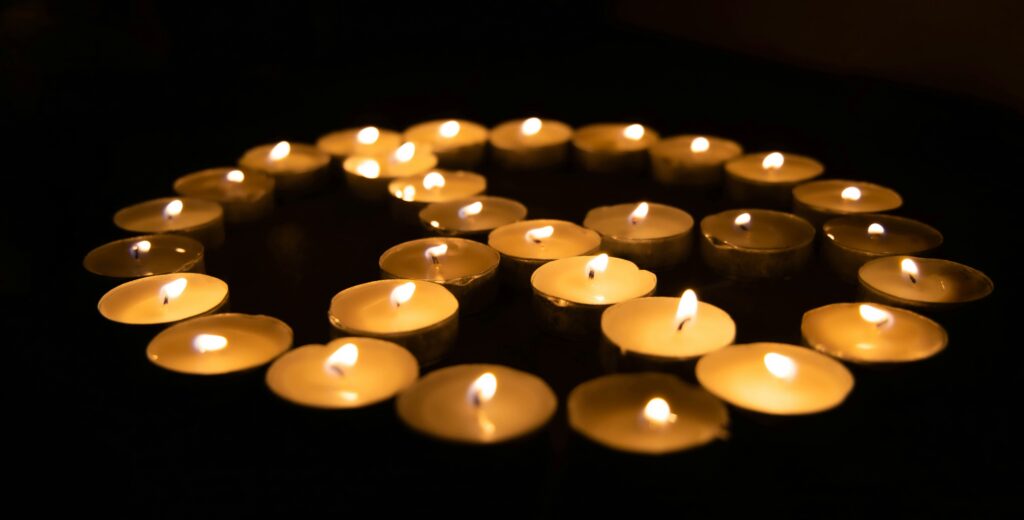Stonecoast Review
The Literary Journal of the Stonecoast MFA
Giudizio Dolce

By Sydney Lea
This guy from the Netherlands grated on me and on all our doctoral peers whenever, with his heavily accented but perfect English, he held forth in our European Literature class.
It didn’t matter whether his arguments were lofty or feeble (we all tended toward the latter appraisal); we knew they’d be protracted. So whenever he began, I cooked up ploys to distract myself until he wound down. Counting the faux gas lamps outside on the quad was among the simpler ones.
I took my advanced degrees in the late 1960s, an era of political turmoil on campuses everywhere; some of us were more involved than others, but the least we could do was signal irreverence toward the status quo by our attire. The women wore skirts so short they’d have been an outrage a few years before. No cosmetics, Lord knows. The men wore bell-bottomed pants, tie- dyed T‑shirts, serapes, and so on, any of which often smelled faintly of pot.
Though this Dutchman claimed to be Marxist, he seemed impervious to such puny rebellion. He wore steel-rimmed glasses, which were hip in that era, but he’d likely worn them from his little boyhood. No one ever saw him out of a dark suit. I had no idea what this bane of our academic lives did when he wasn’t opining in class.
Where did he go? I bumped into him elsewhere just once—a half hour before seminar on a sleety March Monday. We’d come to the Rexall lunch counter to fuel up on coffee. He’d gotten there well ahead of me, to judge from the slew of small creamers in front of him.
When I ordered an English muffin and a black coffee, the guy spoke up. “I, too, will have coffee.”
The counterman looked dazed. “Another one?” he asked. Then he scampered away as if he were being chased.
Our pedant claimed he had important plans for class. He scarcely took a breath as he gave me a few hints. “I will speak of Marvell, Cromwell … and Trotsky,” he gasped.
I knew better than to say anything.
Soon enough, I fumed through his “radical response” to Andrew Marvell’s “The Picture of Little T.C. in a Prospect of Flowers.”
Of all the poems to move a reader to the barricades! He blabbed on, especially about the poem’s final stanza:
Gather the flowers, but spare the buds;
Lest Flora angry at thy crime,
To kill her infants in their prime,
Do quickly make the example yours …
I can’t imagine by what twisted argument he linked this passage to the King Charles regicide, or how he saw it as a paean to Oliver Cromwell. I was always tempted to walk out on such bullshit; I even imagined punching the blowhard, though I knew that would be too cruel. He’d surely never been in a fight. It was literary violence that turned him on, that inspired his self-styled unorthodoxy. When it came to John Milton’s war in heaven, I saw him drool, pumping his hand in the air like a school child. Again, I can’t remember the drift of his drivel on that famous battle.
As I say, every time the Dutchman launched his rhetoric, I’d conjure something to distract me. One morning, I scanned the room, my eyes at floor level, trying to match each classmate to her or his shoes. I wanted a perfect score when I looked up, so the process took some time. When I finally ticked off my successes and failures, I half-believed that the failures were frowned on by the ancient dignitary who peered down from a portrait above the fireplace. If I ever knew that patriarch’s name, I’ve forgotten it. I recall how his hair fell in ringlets, and how, to kill more time, I tried to count them.
I could also stare at the sky through the room’s rippled panes. I might try to figure out whether the jets, leaving contrails in their wake, were headed for distant nations, maybe even the Netherlands. Again, it was only a matter of eating up minutes.
In spring, I watched the gamboling of squirrels in a pocked beech.
I must have struck our teacher as a dreamer. The one time he called on me, he asked: “If you had to define Realism, how would you go about it?”
I don’t know how I answered, but my classmates shot me quizzical looks. After that, the professor never addressed me directly—about anything—and I rarely ventured an opinion, either. I didn’t want to stir up rebuttal from our Dutch dilettante. I’d paid all the dues I owed over coffee that morning, and the last thing I needed was to engage with him again! You know the type: the self-proclaimed smartest guy in the room.
My dislike for this man lasted for more than fifty years, and it was always a trivial thing in any larger scheme. In spite of him, I enjoyed my graduate years or at least I look back on them more fondly than the college ones. That some of my classmates, now eighty years old, seem to view their undergraduate span as the pinnacle of their lives will always puzzle me.
I’ve kept perhaps three or four lasting friends from college. I made equally few, but in some cases, closer ones in grad school. But apart from the occasional visit, letter or, lately, email, to keep me in touch with them (and two are dead now), I haven’t reflected much on that doctoral phase either. That my friends had a similar education is hardly the tie that binds. All of which made it unusual for me to open the most recent graduate school’s newsletter, which I usually delete unread. In reading it, I discovered that our Dutch contemporary had died twenty-plus years ago.
“Jesus!” I huffed, as if I’d had my wind knocked out. My surroundings looked unfamiliar. I felt like I’d never sat at my desk, which I bought forty years ago from a dear neighbor, now dead himself. Two gawping ravens winged by my window. Everything felt ominous.
These memories have all been prompted by the news of the Dutchman’s death but also by my mysterious reaction to it.
Word had come so late only because the man’s widow had wanted to gather enough funding for a Dutch foundation, which she’d named for our graduate nemesis. She thought that by announcing the charity, once it was established, she’d allow his old friends to remember him admiringly. I felt a jolt of sadness. I wasn’t sure he’d made any of what you’d call friends.
The foundation’s mission? “To foster peace and tolerance among peoples,” two ideals our old rival apparently embodied in his professional life. No matter his intellectual pretensions in our time, he hadn’t had a scholarly career but had taken a post with an international humanitarian organization.
After thirty years of service, his death came in Sudan in 1999, not from that country’s endless violence but from some rare blood disease. He was sent home, since no adequate facility for treatment existed in that part of Africa— or anywhere, it seems. Still, the expertise of specialists in Amsterdam couldn’t save him.
Yes, all this flat out ambushed me! I was filled with a seemingly disproportionate remorse, given how I’d once felt about the man. Tolerance? How little I’d shown him, and indeed many others who crossed my path back then. I was all for world peace, I suppose, but not necessarily personal.
This wouldn’t be the last time I hoped that being ignorant in one’s youth is a forgivable sin. I thought of that old saw about not judging a book by its cover, but more pointedly of some frequent advice from Amico, my beloved late grandfather-in-law, who could tell from our very first meeting that I was one hypercritical son of a bitch.
The old man would frequently encourage giudizio dolce, gentle judgment. His view of the world, I always believed, accorded with the state religion W.H. Auden proposed for his whimsical utopia in The Dyer’s Hand: “Roman Catholic, but in an easy-going, Mediterranean sort of way.”
I sat still for minutes on end, that paragraph of alumni notes glaring at me from my laptop’s screen. Then I stepped out the back door to gaze at the steep ridge to our west. The hardwood buds were showing as pretty a red as always for this time of year, but now recalled the shade of blood. I turned my back on it.
The easterly view felt more auspicious. The hills were cloaked in evergreen. The pines’ new needles stood on top of the old ones like candles, so bright did they look against the granite.
If I’d been a Catholic like Amico, easy-going or otherwise, I might have pictured each of those little flares as a votive. Instead, I thought of a famous phrase, attributed to everyone from Confucius to Adlai Stevenson: “It’s better to light a candle than to curse the darkness.”
Standing in the chill, I did what I’d done many times before and will keep doing: I prayed to whatever non-specific God I own that I might be pardoned for ungenerosity in my life, which has been much less dedicated to the good of the world than my old grad school peer’s.
Poet, essayist, and novelist SYDNEY LEA has penned more than twenty books in his storied career. Though he was accorded the honor of Vermont poet laureate (2011–2015), a rich Maine heritage has always informed Lea’s work. Recently, he connected with Stonecoast faculty member Susan Conley, who studied poetry with Lea at Middlebury College and wrote her first book, a collection of poems, under his mentorship, to discuss those literary influences, his views on craft, and what makes for great storytelling. Conley is the author of five books including the novels Landslide and Elsey Come Home and the memoir The Foremost Good Fortune. A collection of Lea’s essays, Such Dancing As I Can, was released by The Humble Essayist Press last fall. His latest novel Now Look, was released in May by Down East Books.
This story originally appeared in Stonecoast Review Issue 20.
Photo by Joshua Sukoff
